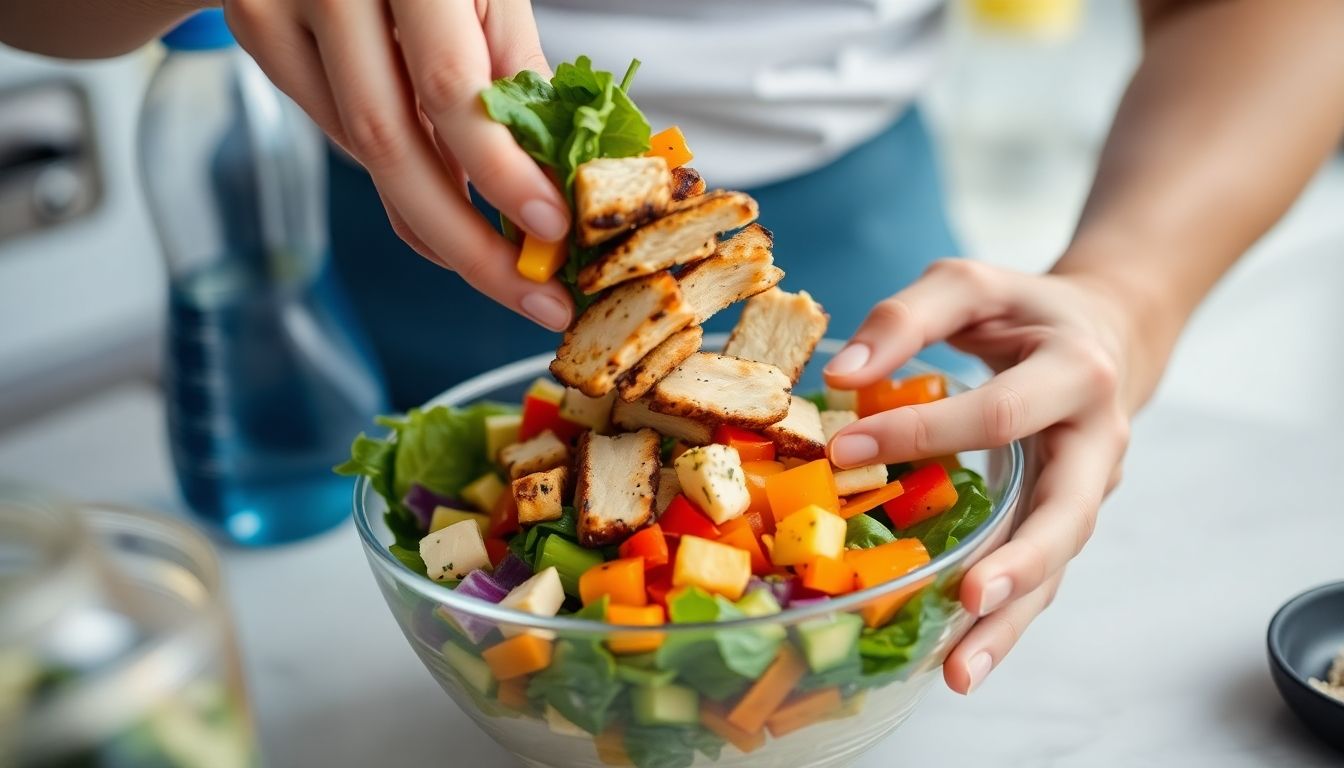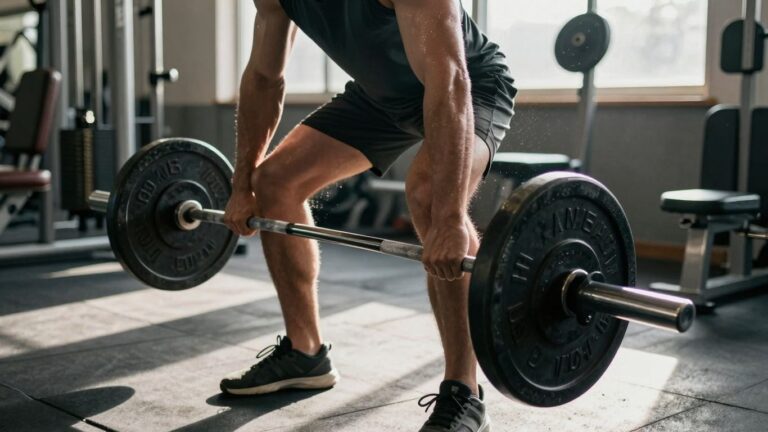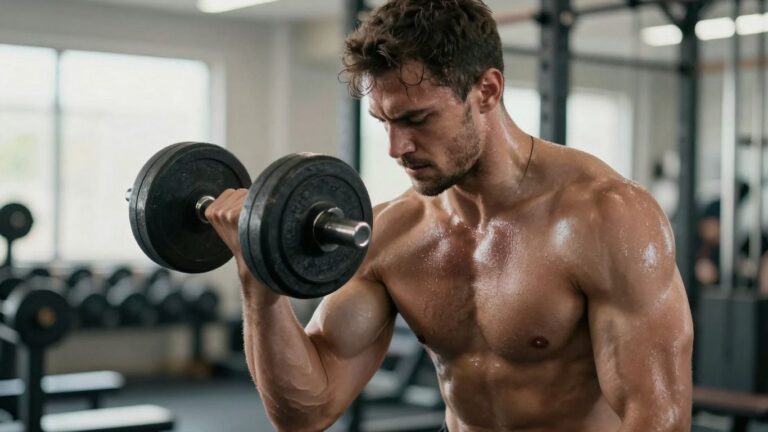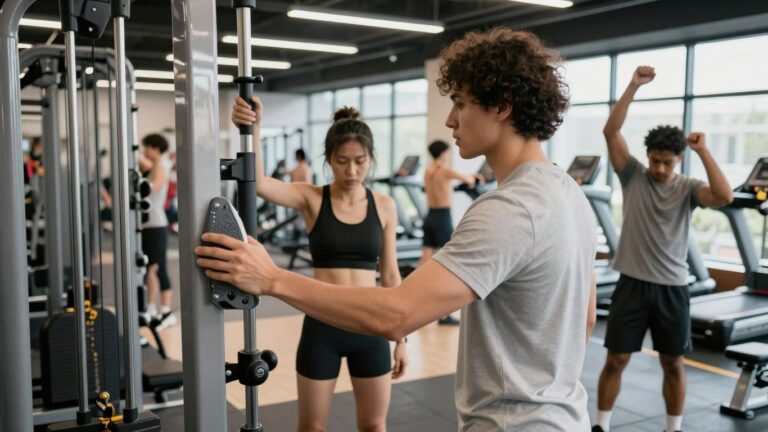You hit the gym hard, right? But are you giving your body what it needs to keep going and get stronger? Proper nutrition and recovery are like the secret sauce for better gym performance. It’s not just about lifting heavy or running fast; it’s about fueling up right and letting your body bounce back. We’ll break down how what you eat and how you rest can seriously change your game.
Key Takeaways
- Eating the right mix of carbs, proteins, and fats gives you the energy needed for workouts and helps muscles repair afterward.
- Carbohydrates are your main energy source, so make sure you’re getting enough to power through your training sessions.
- Protein is vital for rebuilding muscle tissue after exercise, helping you get stronger and reducing injury risk.
- Staying hydrated is just as important as food; it helps regulate body temperature and keeps everything working smoothly.
- Consistent daily eating habits, not just around workouts, are key for sustained energy and overall athletic health.
Fueling Your Workouts: The Power of Nutrition
Alright, let’s talk about what really makes your gym sessions go from ‘meh’ to ‘wow!’ It all starts with what you put into your body. Think of food as the fuel for your engine. If you’re putting in low-grade stuff, you’re not going to get peak performance, right? Proper nutrition is like giving your body premium gas, ready to tackle whatever workout you throw at it.
Understanding Macronutrient Needs
So, what exactly are these ‘macronutrients’? They’re basically the big three: carbohydrates, protein, and fats. Your body needs all of them, but in different amounts depending on what you’re doing. For gym-goers, especially those pushing hard, getting the balance right is key. It’s not just about eating enough, but eating the right things at the right times.
- Carbohydrates: These are your body’s go-to energy source. They break down into glucose, which is what your muscles use to power through those tough sets. Without enough carbs, you’ll feel sluggish and won’t be able to perform at your best. Think of them as the quick energy you need to get going.
- Protein: This is your muscle’s best friend. It’s what helps repair and build muscle tissue after you’ve broken it down during exercise. You need protein to recover and get stronger.
- Fats: Don’t fear fats! Healthy fats are important for hormone production and overall health. They’re also a source of energy, though not as quick as carbs.
Getting these three in the right proportions helps keep your energy levels stable and supports muscle growth and repair. It’s a delicate balance, and what works best can vary from person to person and even day to day based on your training load.
Carbohydrates: Your Primary Energy Source
When you’re hitting the gym, especially for longer or more intense sessions, carbohydrates are your main power source. They get converted into glucose, which is then stored in your muscles and liver as glycogen. This stored glycogen is what your body taps into when you need immediate energy. If your glycogen stores are low, you’re going to hit a wall much sooner than you’d like. That’s why making sure you’re getting enough quality carbs is so important for sustained performance. Think of whole grains, fruits, and vegetables as your best bet for steady energy.
Eating enough carbohydrates before a workout can significantly impact your ability to perform. It ensures your muscles have readily available fuel to draw from, preventing that dreaded mid-session fatigue and allowing you to push harder for longer.
The Role of Protein in Performance
While carbs provide the immediate energy, protein is the builder and repairer. Every time you work your muscles, you create tiny tears. Protein is what your body uses to fix those tears, making your muscles stronger and more resilient. It’s not just about building big muscles, though. Adequate protein intake helps with overall recovery, reducing soreness and getting you ready for your next training session faster. Aiming for a good protein source with meals and after workouts is a smart move for anyone serious about their fitness goals. You can find great protein sources in lean meats, fish, eggs, dairy, and plant-based options like beans and tofu. For those looking to boost their intake, exploring options like protein powders can be helpful.
Rebuilding Stronger: Nutrition for Muscle Recovery
After a tough workout, your muscles are basically begging for some TLC. That’s where recovery nutrition comes in. It’s not just about eating; it’s about giving your body the right building blocks to repair itself and come back even stronger for your next session. Think of it as the essential follow-up to all that hard work you put in.
Protein’s Crucial Role in Repair
Protein is the undisputed champ when it comes to muscle repair. During exercise, especially resistance training, you create tiny tears in your muscle fibers. Protein provides the amino acids, which are like the tiny bricks, needed to patch these tears up and rebuild the muscle tissue. Getting enough protein after your workout helps speed up this process, making your muscles more resilient.
- Aim for about 20-40 grams of protein post-exercise. This amount is generally considered optimal for stimulating muscle protein synthesis.
- Different protein sources offer varying amino acid profiles. Whey protein is popular because it’s fast-digesting and rich in branched-chain amino acids (BCAAs), but other sources like casein, soy, or even plant-based blends can also be effective.
- Don’t forget that your total daily protein intake matters just as much as post-workout timing. Spreading your protein intake throughout the day supports continuous muscle repair.
Optimizing Post-Exercise Nutrient Timing
While protein is key, when you consume it can also make a difference. There’s a window of opportunity after exercise where your body is particularly receptive to nutrients for recovery. This doesn’t mean you have to chug a shake the second you finish your last rep, but trying to get some protein and carbohydrates in within a couple of hours can be beneficial.
Here’s a simple breakdown:
- Within 30-60 minutes: If possible, a small, easily digestible protein and carb snack can kickstart the recovery process. Think a banana with a small handful of almonds or a protein bar.
- Within 2-3 hours: Aim for a more substantial meal that includes a good source of protein and complex carbohydrates to fully replenish energy stores and continue muscle repair.
- Throughout the day: Continue to prioritize protein-rich foods in your subsequent meals to maintain a positive protein balance.
The idea of a strict, narrow “anabolic window” has been somewhat overblown. While immediate post-exercise nutrition is helpful, consistent, adequate intake throughout the day is the most important factor for long-term muscle growth and recovery. Don’t stress too much if you miss the immediate window; focus on the bigger picture of your overall diet.
The Importance of Hydration
Water is involved in pretty much every bodily function, and muscle recovery is no exception. Dehydration can slow down nutrient transport to your muscles and hinder the removal of waste products, making you feel sluggish and sore. Staying properly hydrated helps keep everything running smoothly.
- Monitor your urine color: Pale yellow is usually a good sign you’re well-hydrated.
- Sip water consistently: Don’t wait until you’re thirsty, as thirst is often a sign you’re already a bit dehydrated.
- Consider electrolytes: If you’ve had a particularly long or intense workout, especially in the heat, replacing electrolytes lost through sweat (like sodium and potassium) can be helpful. Sports drinks or electrolyte tablets can assist with this.
Beyond the Gym: Daily Nutrition Habits for Athletes
So, you’re hitting the gym hard, pushing your limits, and seeing some awesome progress. That’s fantastic! But what you do outside of your workout sessions is just as important, if not more so. Think of your daily food intake as the ongoing maintenance and upgrade for your body’s performance system. It’s not just about what you eat right before or after training; it’s about building a solid nutritional foundation every single day.
Creating a Balanced Daily Diet
Eating well day-to-day isn’t about following a super strict, complicated plan. It’s more about making smart choices consistently. Your body needs a good mix of carbohydrates, proteins, and fats to function optimally. For most athletes, a good starting point for your daily intake looks something like this:
- Carbohydrates: Aim for about 45-65% of your daily calories. These are your main energy providers, so don’t shy away from them! Think whole grains, fruits, and veggies.
- Protein: Around 15-25% of your calories should come from protein. This is what helps repair and build muscle tissue.
- Fats: The remaining 20-35% should be healthy fats. These are important for hormone production and overall health.
It’s also really helpful to include a wide variety of foods. This means loading up on colorful fruits and vegetables, lean meats, fish, eggs, and low-fat dairy or dairy alternatives. This variety ensures you’re getting all the different vitamins and minerals your body needs to recover and stay healthy.
Choosing Quality Fats
When we talk about fats, it’s easy to think of the unhealthy stuff, but good fats are actually super beneficial for athletes. These are the unsaturated fats that help reduce inflammation and support your body’s functions. Instead of reaching for fried snacks or pastries, try incorporating sources like:
- Avocado
- Nuts (like almonds, walnuts, and cashews)
- Seeds (chia seeds, flaxseeds, sunflower seeds)
- Olive oil
- Fatty fish (like salmon and mackerel)
These fats not only taste great but also provide sustained energy and help your body absorb certain vitamins. Making these swaps can make a big difference in how you feel and perform.
Meeting Energy Demands Consistently
Your body is constantly using energy, even when you’re not actively working out. If you’re training regularly, your energy needs are even higher. Skipping meals or not eating enough throughout the day can leave you feeling drained, hinder your recovery, and even make you more prone to getting sick or injured. It’s a good idea to eat regular meals and include healthy snacks between them to keep your energy levels steady. This consistent fueling helps your body adapt to training and perform at its best day after day. Think of it like keeping a car’s gas tank topped up – you wouldn’t wait until it’s empty to refuel, right?
Smart Strategies for Enhanced Performance
Maximizing Glycogen Stores
Think of your muscles like a car’s fuel tank. Glycogen, which is stored carbohydrates, is the premium fuel. To really push yourself in the gym, especially for longer or more intense sessions, you want those tanks as full as possible before you even start. This is where ‘carb-loading’ comes in, but it’s not just about stuffing your face the night before a competition. It’s more about consistently making sure your daily diet includes enough quality carbohydrates so your body has a good reserve built up.
- Focus on complex carbs: Think whole grains, oats, brown rice, and starchy vegetables. These release energy slowly, keeping you fueled longer.
- Timing matters: Consuming carbs in the hours leading up to a workout is key. Don’t skip meals, especially the one before you hit the gym.
- Listen to your body: Some people do better with more carbs, others with slightly less. Pay attention to how you feel during your workouts.
Loading up on carbs before a big workout isn’t just about having energy; it’s about giving your muscles the best chance to perform at their peak and recover faster afterward. It’s like giving yourself a head start.
Hydration Strategies During Exercise
Staying hydrated isn’t just about quenching your thirst; it’s a performance booster. Even a small amount of dehydration can make you feel sluggish and tired, impacting your strength and endurance. You lose fluids through sweat, and if you don’t replace them, your body has to work harder.
Here’s a simple way to think about it:
- Sip regularly: Don’t wait until you’re parched. Take small sips of water or an electrolyte drink every 15-20 minutes during your workout.
- Know your sweat rate: Weigh yourself before and after a workout (without clothes) to get an idea of how much fluid you lose. Aim to replace most of that loss.
- Consider electrolytes: For longer or more intense sessions, especially in the heat, an electrolyte drink can help replace salts lost through sweat and aid in fluid absorption.
Weight Management for Performance
When we talk about weight management for athletes, it’s not about hitting a specific number on the scale just for looks. It’s about having a body composition that supports your training goals. Carrying excess body fat can make movements harder and put extra strain on your joints, while being too underweight might mean you don’t have enough fuel or muscle mass to perform optimally.
- Focus on nutrient density: Choose foods that pack a lot of nutrients without a lot of extra calories. Think lean proteins, colorful fruits, and vegetables.
- Balance is key: It’s not about cutting out entire food groups. It’s about finding the right mix of protein, carbs, and healthy fats that keeps you energized and supports muscle repair.
- Consistency over extremes: Sustainable changes are better than crash diets. Small, consistent adjustments to your eating habits will yield better long-term results for performance and health.
Navigating Nutrition Information
It can feel like a jungle out there when you’re trying to figure out what to eat to perform your best. There’s so much information flying around, and honestly, not all of it is good. Let’s break down how to sort through it all.
Seeking Professional Guidance
When you’re serious about your training, getting advice from someone who actually knows their stuff makes a huge difference. Think of it like going to a mechanic for your car – you want someone with the right tools and knowledge. For nutrition, that means looking for a registered dietitian (RD) or a registered dietitian nutritionist (RDN). These folks have gone through serious schooling and training to understand how food impacts your body, especially when you’re active.
- Registered Dietitians (RDs) / Registered Dietitian Nutritionists (RDNs): These are the gold standard. They can help you create a personalized plan based on your specific sport, training schedule, and goals.
- Sports Dietitians: A specialized RD who focuses specifically on athletes. They understand the unique demands of training and competition.
- Other Professionals: While coaches and trainers can offer general healthy eating tips, they usually aren’t qualified to give detailed dietary plans. Be cautious if they’re giving very specific advice beyond basic healthy eating.
It’s easy to get overwhelmed by conflicting advice. A professional can cut through the noise and give you clear, actionable steps tailored just for you.
Understanding Supplement Use
Supplements are a big part of the sports world, and it’s easy to get caught up in the hype. Many athletes use them, hoping for an edge. However, it’s a tricky area.
- What are supplements? These are products taken to add nutrients to your diet, like vitamins, minerals, protein powders, or specialized compounds. They are meant to supplement your diet, not replace whole foods.
- Why the caution? The supplement industry isn’t regulated like food or medicine. This means:
- Purity: Products might not contain what they say they do, or they could have unlisted ingredients.
- Contamination: Some supplements can be accidentally contaminated with banned substances, which could lead to a positive drug test.
- Effectiveness: Not all supplements are proven to actually improve performance for everyone.
- Best Practice: If you’re considering supplements, talk to your RD or a sports medicine doctor first. They can help you understand if a supplement might be beneficial for you and guide you toward reputable brands that have third-party testing (like NSF Certified for Sport or Informed-Sport).
Debunking Common Nutrition Myths
Oh, the myths we hear! Let’s clear up a few common ones:
- Myth: Eating more protein automatically means more muscle. While protein is key for muscle repair and growth, your body can only use so much. Eating way more than you need won’t magically build bigger muscles and can just be extra calories.
- Myth: You need special “athlete” foods to perform well. Whole, unprocessed foods are your best friends. Fruits, vegetables, lean meats, whole grains, and healthy fats provide the nutrients you need. Fancy “athlete” bars or drinks are often just convenient ways to get carbs and electrolytes, which you can also get from regular food.
- Myth: Carbs make you fat. For athletes, carbohydrates are your primary fuel source! They are essential for energy during workouts. The type and timing of your carb intake matter more than avoiding them altogether.
It’s always a good idea to question what you hear and look for evidence-based information. Your body is unique, and what works for one person might not work for another. Focus on building a solid foundation with whole foods, proper hydration, and smart training, and then consider supplements or specific strategies with professional guidance.
Wrapping It Up
So, there you have it. Getting your nutrition and recovery right isn’t just some extra stuff to worry about; it’s a big part of actually getting better at the gym. Think of it like this: you wouldn’t put cheap gas in a race car and expect it to win, right? Your body is kind of the same. Eating well and letting yourself recover properly means you’ll have more energy, bounce back faster from tough workouts, and generally feel stronger. It might seem like a lot at first, but making these things a priority will seriously pay off in the long run. You’ll be hitting new personal bests before you know it!
Frequently Asked Questions
Why is eating the right foods so important for working out?
Think of food as fuel for your body. Just like a car needs the right gas to run well, your body needs proper nutrition to give you energy for workouts, help your muscles get stronger, and allow you to recover faster. Eating well helps you perform better and avoid getting tired too quickly.
What are the main types of food I need and why?
You need three main types of nutrients: carbohydrates, proteins, and fats. Carbohydrates are your main energy source, like the gas for your car. Proteins are like the building blocks for your muscles, helping them repair and grow. Fats are also important for energy and other body functions, but it’s best to choose healthy ones.
How much protein do I really need after a workout?
Protein is super important for fixing muscles after you exercise. While eating a lot of protein isn’t always better, getting enough helps your muscles rebuild. It’s a good idea to have some protein within a couple of hours after exercising. Spreading your protein intake throughout the day is also a smart move.
Does drinking water really make a difference for my gym performance?
Absolutely! Staying hydrated is a big part of nutrition. When you exercise, you sweat and lose fluids. Not drinking enough water can make you feel tired, affect your performance, and even lead to health problems. Make sure to drink water before, during, and after your workouts.
I hear about athletes needing to manage their weight. How does nutrition help with that?
Nutrition plays a key role in keeping your body at a healthy weight that’s good for your sport. Eating the right foods helps you have enough energy without taking in too many extra calories. If you have specific weight goals for your sport, talking to a professional can help you reach them safely and effectively.
Where can I find reliable information about sports nutrition?
It can be tough to sort through all the nutrition advice out there! The best way to get accurate information is to talk to a registered dietitian or a sports nutritionist. They can give you personalized advice based on your specific needs and goals, helping you avoid common mistakes and myths.




